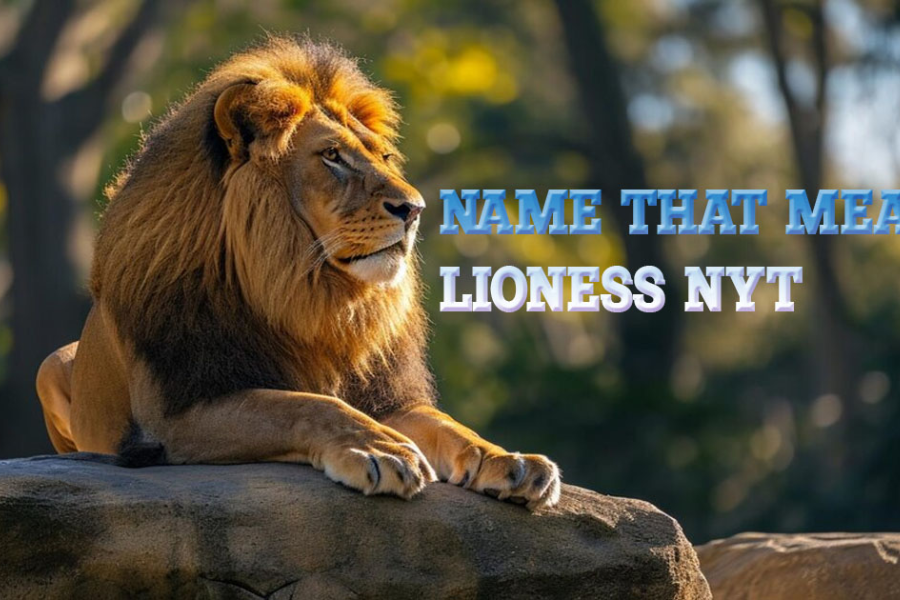Crossword puzzles have captivated enthusiasts for generations, offering not just a test of vocabulary but a window into language, culture, and history. Among these puzzles, The New York Times Mini Crossword stands out for its quick yet stimulating clues that often blend challenge with education. A particularly fascinating clue that has caught the attention of many is: “Name that means ‘lioness’.” This clue not only tests your knowledge but also invites you to explore the rich tapestry of language. In this article, we’ll uncover the origins and significance of this name, delve into its appearance in the NYT Mini Crossword, and explore why such clues are both challenging and rewarding.
Exploring the Clue: “Name That Means ‘Lioness’ NYT”
The clue “Name that means ‘lioness’” is intriguing in its simplicity and depth. On the surface, it may seem like a straightforward request for a name with a specific meaning. However, it challenges solvers to think beyond the obvious, to consider names not just as labels but as carriers of history, culture, and meaning. Names, especially those with significant meanings, often have deep cultural and historical roots, and this clue is a perfect example of how crossword puzzles can open up a world of knowledge.
The Answer: Leona
For those familiar with the Latin roots of many English names, the answer to the clue “Name that means ‘lioness’” comes as no surprise: it is Leona. Derived from the Latin word “leo,” meaning lion, Leona directly translates to “lioness.” The name is not just a common moniker but carries with it a sense of strength, courage, and regality—traits often associated with lions, the so-called kings of the jungle.
Leona, as a name, embodies a powerful and majestic connotation, which is likely why it has maintained its popularity across generations. It’s a name that speaks to the qualities of a lioness: fierce, protective, and noble.
Historical and Cultural Significance of the Name Leona
In many cultures, names are more than mere identifiers; they are reflections of values, hopes, and even divine attributes. Leona, meaning “lioness,” is a name that carries with it the weight of history and the strength of cultural significance. Lions have been symbols of power and nobility in various cultures throughout history, and the name Leona, by extension, represents these qualities in a personal and intimate way.
The name Leona has been in use for centuries, consistently chosen for its strong and regal connotations. It’s a name that suggests a deep connection to the natural world and the qualities admired in lions—strength, courage, and leadership. In a way, those who bear the name Leona are seen as embodying these traits, making it a popular choice for parents who wish to bestow upon their children a name with a powerful meaning.
Leona in Popular Culture
The name Leona has made its mark not just in history and culture but also in popular culture. One of the most notable bearers of the name in recent times is Leona Lewis, a British singer known for her powerful voice and emotive performances. Her rise to fame has brought renewed attention to the name, associating it with not just strength and nobility but also with talent and grace.
Leona has also appeared in various forms of literature, television, and film, often chosen for characters who embody strength and resilience. The use of the name in popular culture further cements its status as a name that carries significant meaning, one that is both timeless and contemporary.
Why Such Clues Are Engaging
Crossword clues like “Name that means ‘lioness’” are engaging for several reasons. Firstly, they do more than just test your vocabulary; they invite you to delve into the etymology and cultural history of words. Understanding the origins of words and names adds a layer of depth to the puzzle-solving experience, making it not just a test of knowledge but a journey of discovery.
Secondly, these clues connect the solver to a broader context. The name Leona, for example, is not just a random word; it is a name with deep cultural significance, and solving the clue gives the solver a sense of connection to that history. It’s a reminder that language is not static but is constantly evolving, with each word carrying with it stories from the past.
Lastly, such clues are rewarding because they offer a moment of realization. When the answer clicks into place, it’s not just about filling in the grid; it’s about understanding the relationship between words, their meanings, and their cultural significance. This is what makes crossword puzzles, especially those from The New York Times, so beloved by enthusiasts—they are not just games, but intellectual challenges that offer both entertainment and education.
Tips for Solving Crossword Clues
If you’re looking to improve your crossword-solving skills, especially when it comes to clues like “Name that means ‘lioness’,” here are a few tips that might help:
- Think About Roots and Origins: Many names and words have their origins in ancient languages, such as Latin, Greek, or Old English. Understanding these roots can give you an edge when solving clues that require knowledge of etymology.
- Consider Popular Culture: Names from popular culture, including those from books, movies, and TV shows, often make their way into crossword puzzles. Staying up-to-date with popular culture can help you recognize these references quickly.
- Use Cross-Referencing: When you’re stuck on a clue, look at the intersecting words in the puzzle. Often, these can provide hints that help you deduce the correct answer.
- Expand Your Vocabulary: The more words you know, the easier it is to solve crossword puzzles. Regularly playing crosswords and reading can help you build a robust vocabulary.
- Practice, Practice, Practice: Like any skill, crossword-solving gets easier with practice. The more puzzles you solve, the more familiar you become with common themes, word patterns, and clue structures.
FAQ on “Name That Means Lioness NYT”
What is the name that means ‘lioness’ in the NYT Mini Crossword?
The name that fits the clue “Name that means ‘lioness’” is Leona.
Why is Leona a name that means ‘lioness’?
Leona is derived from the Latin word “leo,” meaning lion, and it directly translates to “lioness.” The name embodies qualities of strength and nobility, much like the lioness in nature.
Is Leona a common name in crosswords?
Yes, Leona is relatively common in crosswords due to its cultural significance, its relatively short length, and its strong association with the lion.
How can I improve my crossword-solving skills?
To improve, you should expand your vocabulary, familiarize yourself with common crossword themes, and practice regularly. Understanding the etymology of words can also provide a significant advantage.
Are there other names that mean ‘lioness’?
While Leona is a common choice, other names with similar meanings include Ariel and Leonie. However, Leona is particularly favored in crossword puzzles due to its direct translation and strong cultural associations.
Why are name clues popular in crosswords?
Names often have fascinating origins and meanings, making them engaging clues that test both knowledge and reasoning. They also connect solvers to a broader cultural and historical context, making the puzzle-solving experience more enriching.
Conclusion
Solving the NYT Mini Crossword clue “Name that means ‘lioness’” is not just about finding the right answer—Leona—it’s about appreciating the rich meanings behind names and the cultural significance they carry. Such clues are a testament to the intricate and educational nature of crossword puzzles, offering both a challenge and a learning opportunity. Whether you are a seasoned solver or a newcomer to the world of crosswords, understanding these nuances can enhance your puzzle-solving experience and deepen your appreciation for the craft.
Get comprehensive features and analysis at Bunkknot.org.

